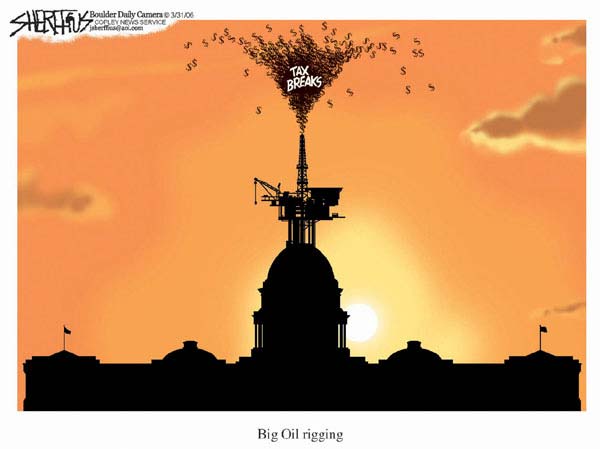Bubba was a lunatic on NWA that said Big Oil didn't get subsidies, and then he said they didn't get big ones. And then he ran....
***
Vague Law and Hard Lobbying Add Up to Billions for Big Oil
By Edmund L. Andrews
The New York Times
Monday 27 March 2006
Washington - It was after midnight and every lawmaker in the committee room wanted to go home, but there was still time to sweeten a deal encouraging oil and gas companies to drill in the Gulf of Mexico.
"There is no cost," declared Representative Joe L. Barton, a Texas Republican who was presiding over Congressional negotiations on the sprawling energy bill last July. An obscure provision on new drilling incentives was "so noncontroversial," he added, that senior House and Senate negotiators had not even discussed it.
Mr. Barton's claim had a long history. For more than a decade, lawmakers and administration officials, both Republicans and Democrats, have promised there would be no cost to taxpayers for a program allowing companies to avoid paying the government royalties on oil and gas produced in publicly owned waters in the Gulf.
But last month, the Bush administration confirmed that it expected the government to waive about $7 billion in royalties over the next five years, even though the industry incentive was expressly conceived of for times when energy prices were low. And that number could quadruple to more than $28 billion if a lawsuit filed last week challenging one of the program's remaining restrictions proves successful.
"The big lie about this whole program is that it doesn't cost anything," said Representative Edward J. Markey, a Massachusetts Democrat who tried to block its expansion last July. "Taxpayers are being asked to provide huge subsidies to oil companies to produce oil - it's like subsidizing a fish to swim."
How did a supposedly cost-free incentive become a multibillion-dollar break to an industry making record profits?
The answer is a familiar Washington story of special-interest politics at work: the people who pay the closest attention and make the fewest mistakes are those with the most profit at stake.
It is an account of legislators who passed a law riddled with ambiguities; of crucial errors by midlevel bureaucrats under President Bill Clinton; of $2 billion in inducements from the Bush administration, which was intent on promoting energy production; and of Republican lawmakers who wanted to do even more. At each turn, through shrewd lobbying and litigation, oil and gas companies ended up with bigger incentives than before.
...snip
http://www.truthout.org/docs_2006/032706G.shtml
.
.

.
.
